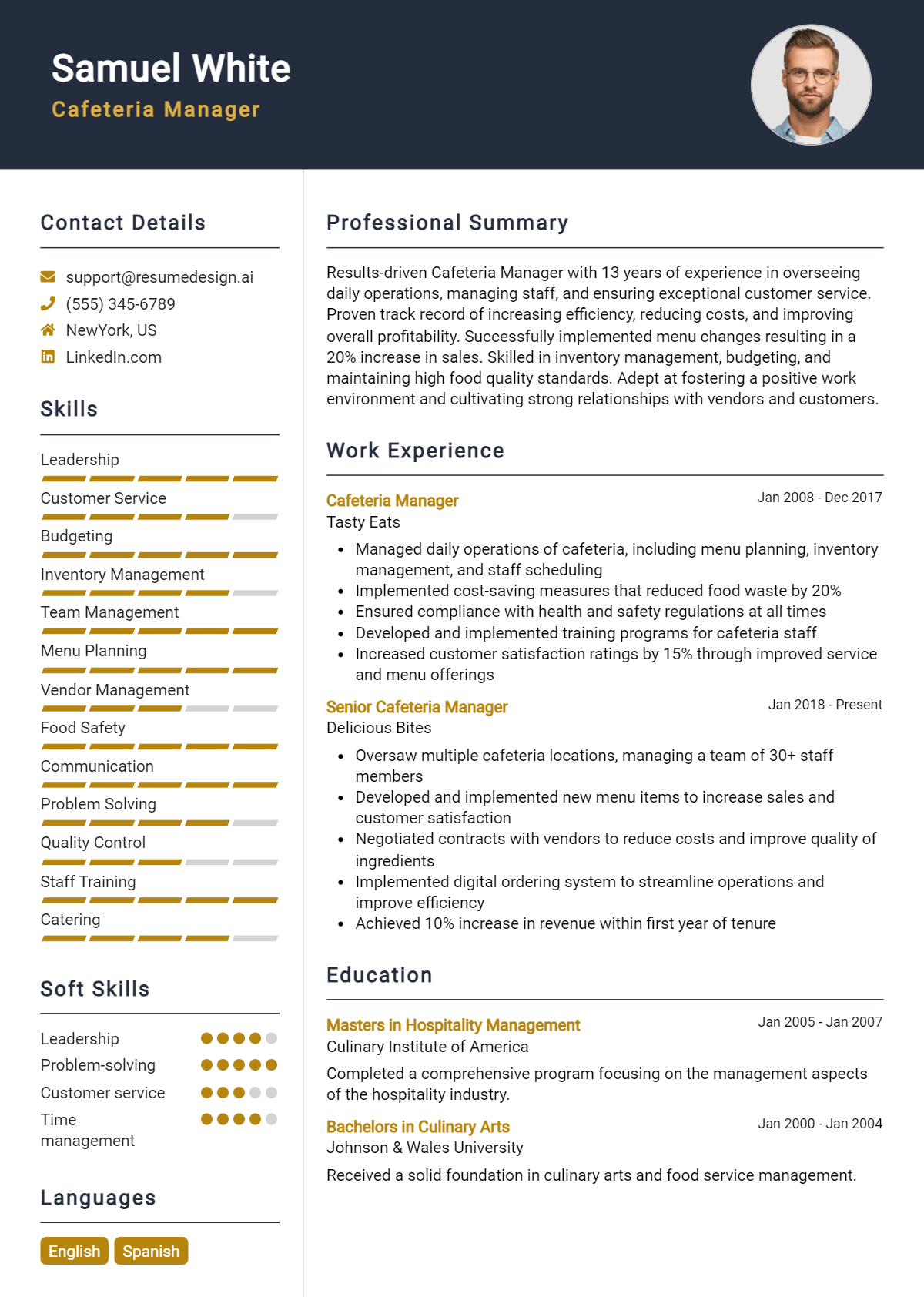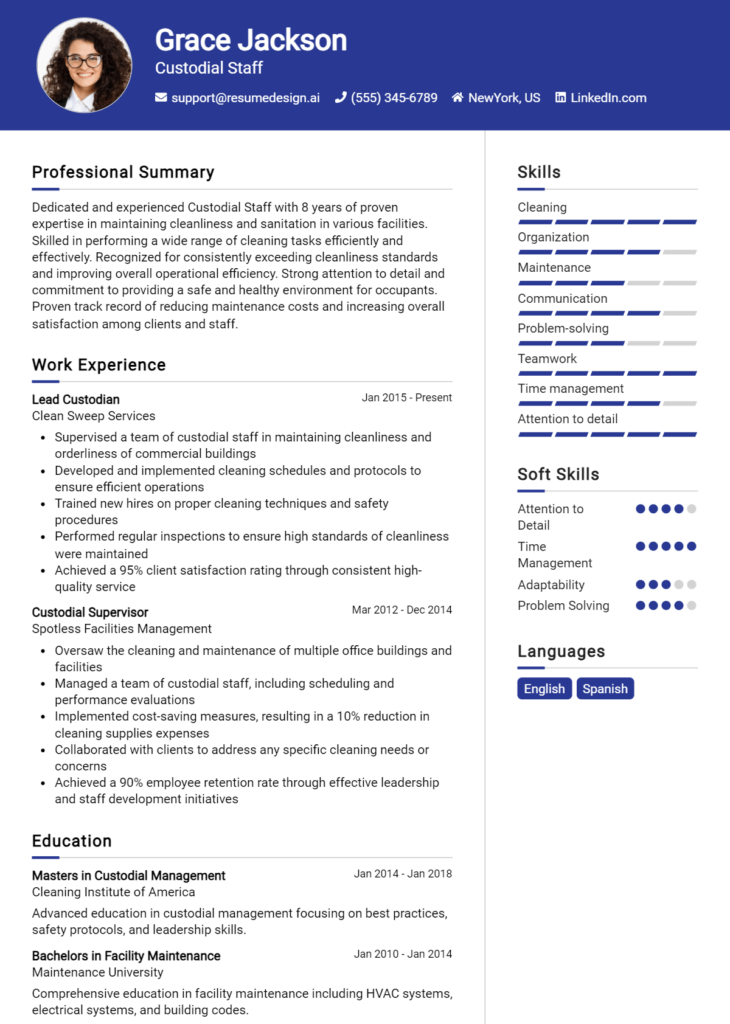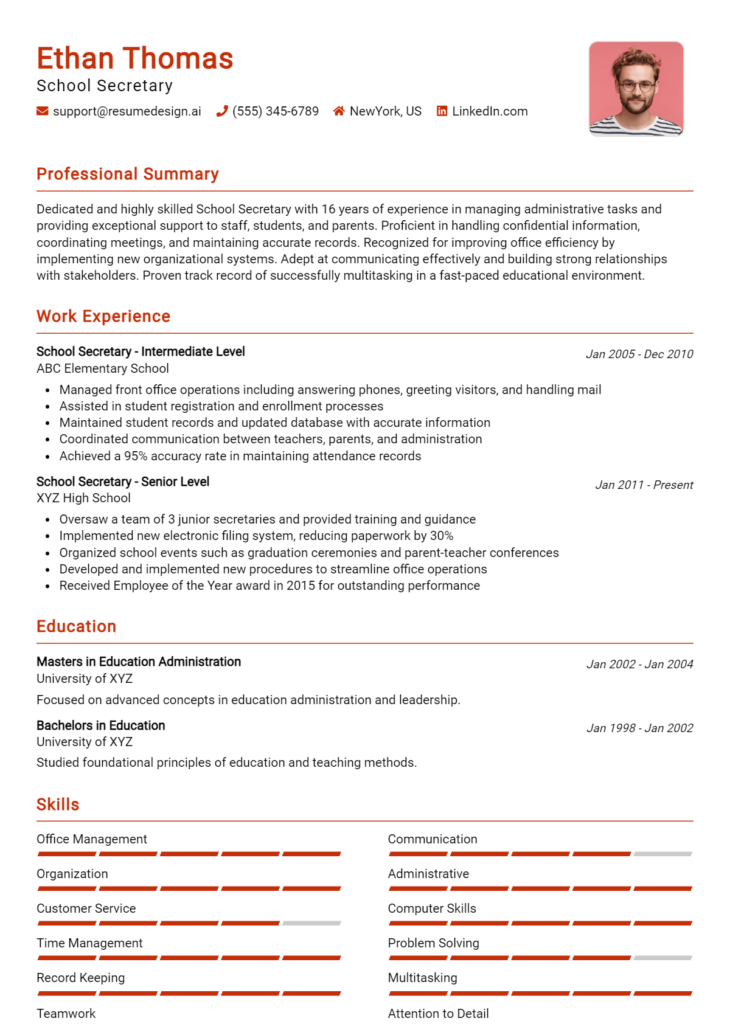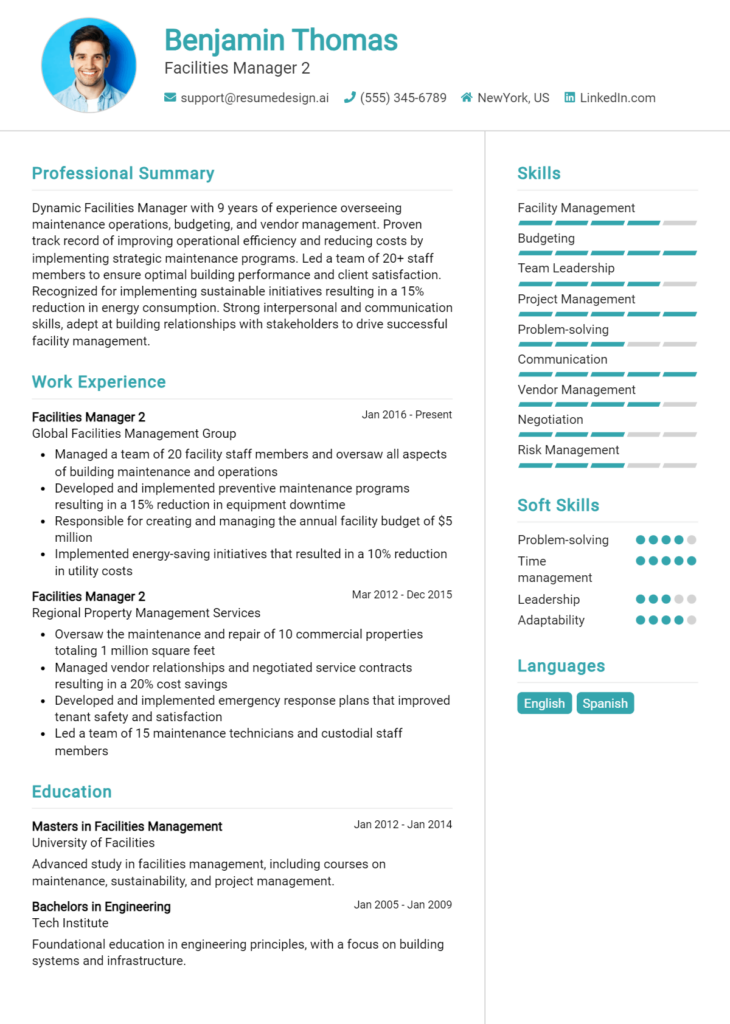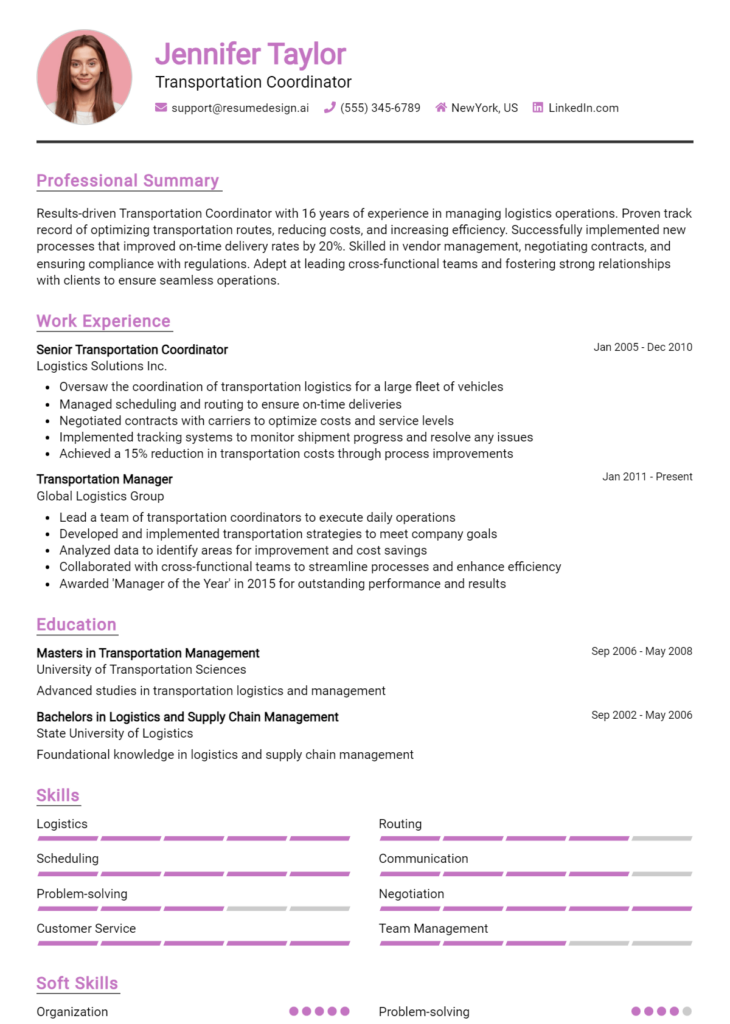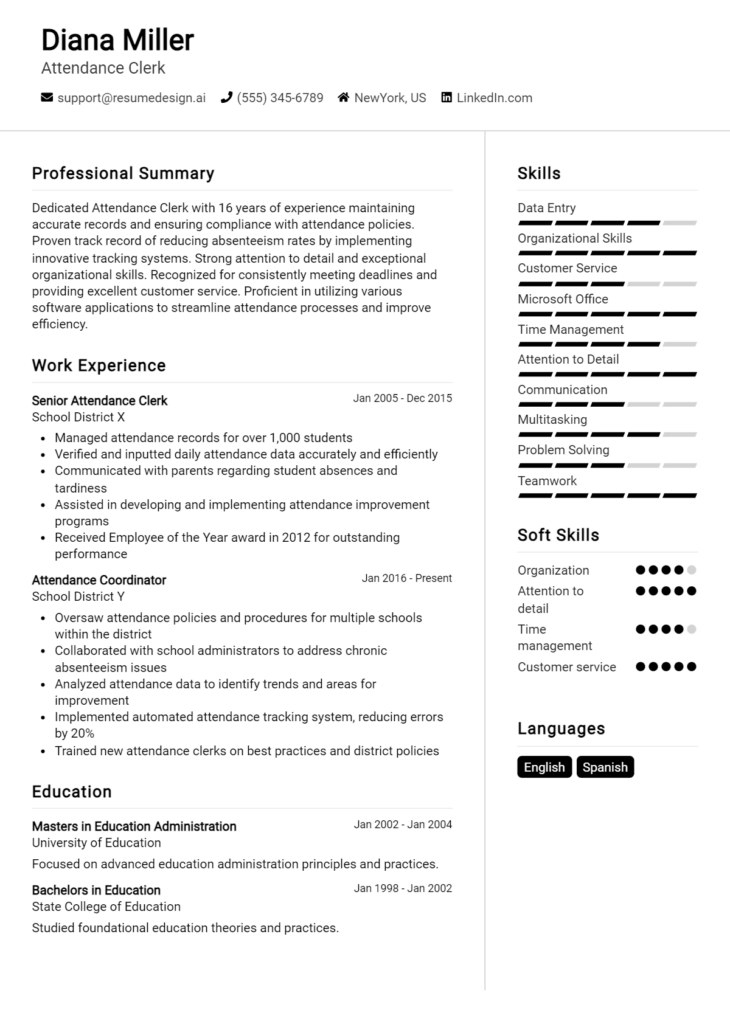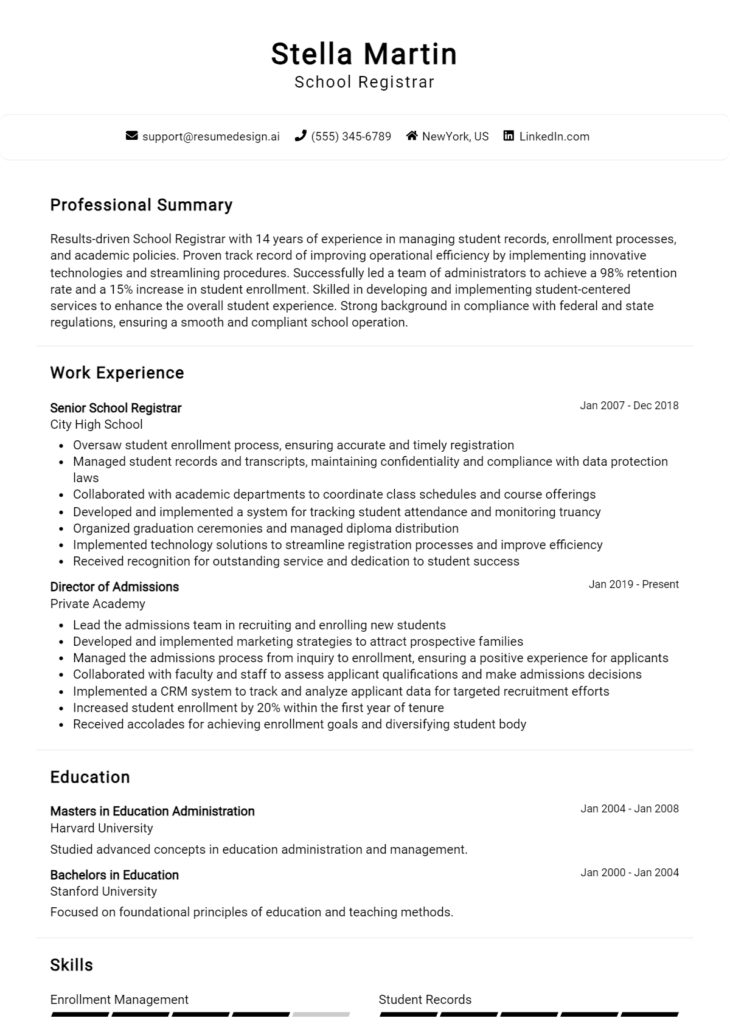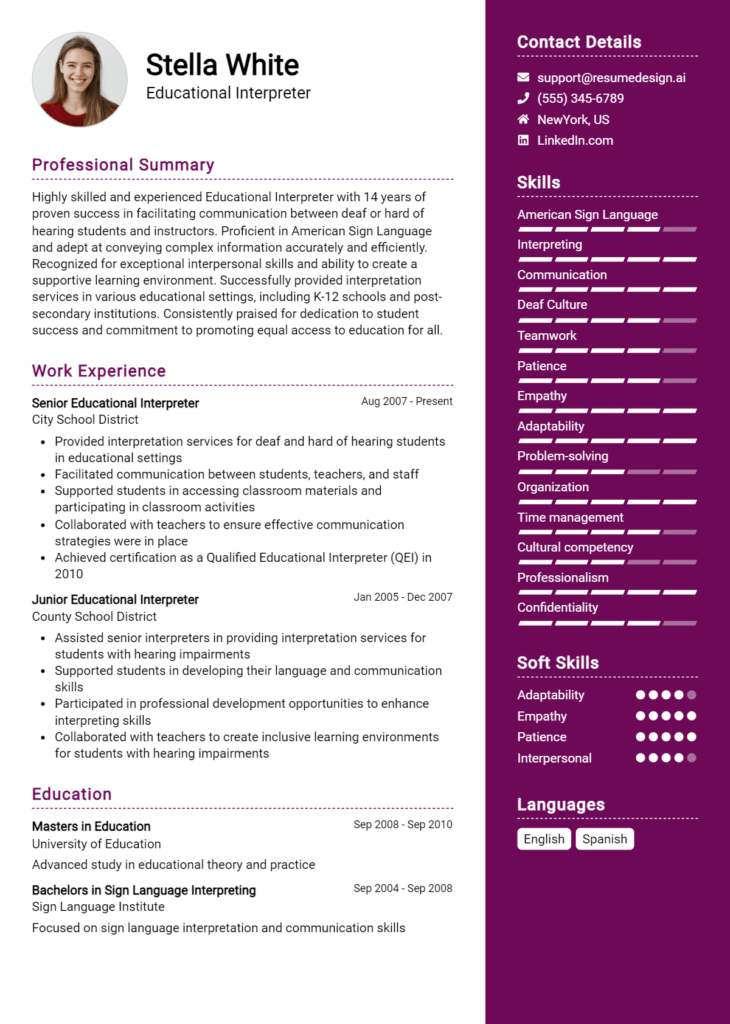Cafeteria Manager Core Responsibilities
A Cafeteria Manager plays a crucial role in overseeing food service operations, ensuring quality, efficiency, and compliance with health regulations. Key responsibilities include managing staff, budgeting, inventory control, and menu planning. Strong technical, operational, and problem-solving skills are essential for coordinating between kitchen staff, suppliers, and administration. These competencies contribute significantly to the organization’s goals, enhancing customer satisfaction and operational efficiency. A well-structured resume can effectively highlight these qualifications, showcasing a candidate's readiness for the role.
Common Responsibilities Listed on Cafeteria Manager Resume
- Supervise daily cafeteria operations and staff management.
- Develop and implement menus that meet nutritional standards.
- Manage inventory, ordering, and vendor relationships.
- Ensure compliance with food safety and sanitation regulations.
- Monitor and control budgetary expenditures.
- Train and develop staff to enhance performance.
- Coordinate with departments for special events and catering.
- Resolve customer complaints and improve service quality.
- Conduct regular staff meetings to foster communication.
- Analyze sales data to optimize menu offerings.
- Implement cost-saving strategies without compromising quality.
High-Level Resume Tips for Cafeteria Manager Professionals
In today's competitive job market, a well-crafted resume is crucial for Cafeteria Manager professionals seeking to make a lasting impression on potential employers. Your resume is often the first insight an employer has into your qualifications and abilities, and it needs to effectively showcase both your skills and achievements in a compelling manner. A strong resume can set you apart from other candidates, demonstrating not only your experience but also your understanding of the unique demands of a cafeteria management role. This guide will provide practical and actionable resume tips specifically tailored for Cafeteria Manager professionals, ensuring you present your best self to prospective employers.
Top Resume Tips for Cafeteria Manager Professionals
- Tailor your resume to each job application by including keywords from the job description.
- Highlight relevant experience in food service management, specifying your roles and responsibilities.
- Quantify your achievements with specific metrics, such as percentage increases in customer satisfaction or cost reductions.
- Showcase your leadership skills by detailing any teams you have managed or trained.
- Include industry-specific skills, such as inventory management, budgeting, and compliance with health regulations.
- Utilize action verbs to describe your accomplishments, making your resume more dynamic and engaging.
- Keep your resume concise, ideally one page, focusing on the most relevant and impactful information.
- Incorporate any certifications or training relevant to food service safety and management.
- Be sure to proofread for grammatical errors and clarity, as attention to detail is vital in management roles.
By implementing these tips, you can significantly enhance your chances of landing a job in the Cafeteria Manager field. A polished and tailored resume not only reflects your professional capabilities but also demonstrates your commitment to excellence, making you a standout candidate in the eyes of hiring managers.
Why Resume Headlines & Titles are Important for Cafeteria Manager
In the competitive landscape of job applications, a well-crafted resume headline or title is essential for a Cafeteria Manager. This succinct phrase serves as the first impression of a candidate's qualifications, allowing hiring managers to quickly gauge their suitability for the role. A strong headline not only grabs attention but also encapsulates key skills and experiences relevant to cafeteria management, making it easier for recruiters to identify top candidates. It is crucial that this title is concise, relevant, and directly aligned with the job being applied for, setting the tone for the rest of the resume.
Best Practices for Crafting Resume Headlines for Cafeteria Manager
- Be concise: Limit the headline to a few impactful words or a short phrase.
- Focus on relevance: Tailor the headline to highlight skills and experiences specific to cafeteria management.
- Use action-oriented language: Incorporate strong verbs that convey leadership and initiative.
- Highlight key achievements: Mention any notable accomplishments or certifications that set you apart.
- Include keywords: Use industry-specific terms that align with the job description.
- Showcase your role: Clearly indicate your position and experience level, such as "Experienced" or "Certified."
- Avoid jargon: Make sure the language is clear and accessible to all hiring managers.
- Keep it professional: Ensure the tone is formal and aligns with the expectations of the industry.
Example Resume Headlines for Cafeteria Manager
Strong Resume Headlines
Dynamic Cafeteria Manager with 10+ Years of Experience in Food Service Operations
Certified Food Safety Manager Specializing in High-Volume Cafeteria Management
Dedicated Cafeteria Manager with Proven Track Record in Cost Reduction and Staff Training
Results-Driven Cafeteria Manager Committed to Enhancing Customer Satisfaction and Meal Quality
Weak Resume Headlines
Cafeteria Manager
Looking for a Job in Food Service
Experienced Manager
The strong headlines are effective because they not only provide clarity regarding the candidate's qualifications but also demonstrate a proactive and results-oriented attitude. Each headline is tailored to emphasize relevant skills and achievements, making them memorable to hiring managers. Conversely, the weak headlines fail to impress due to their vagueness and lack of detail; they do not convey a sense of purpose or specificity about the candidate's qualifications, making it difficult for recruiters to see the value in the applicant.
Writing an Exceptional Cafeteria Manager Resume Summary
A well-crafted resume summary is crucial for a Cafeteria Manager as it serves as the first impression for hiring managers. This brief yet impactful statement encapsulates the candidate's key skills, relevant experience, and notable accomplishments, effectively drawing attention in a competitive job market. A strong summary not only highlights the candidate's qualifications but also aligns them with the specific needs of the position being applied for. By being concise and tailored, a resume summary can set the tone for the entire application, making it an essential component of a successful job search.
Best Practices for Writing a Cafeteria Manager Resume Summary
- Quantify achievements to demonstrate impact (e.g., "Increased customer satisfaction by 20%").
- Focus on relevant skills such as inventory management, budgeting, and staff training.
- Tailor the summary to match the specific job description and company culture.
- Use action verbs to convey confidence and professionalism (e.g., "Oversaw," "Managed," "Implemented").
- Keep it concise, ideally within 2-4 sentences.
- Highlight unique accomplishments that set you apart from other candidates.
- Incorporate industry-specific terminology to demonstrate knowledge and expertise.
- Maintain a positive and proactive tone throughout the summary.
Example Cafeteria Manager Resume Summaries
Strong Resume Summaries
Dynamic Cafeteria Manager with over 10 years of experience in high-volume food service environments. Successfully increased operational efficiency by 30% through streamlined inventory management and staff training programs. Proven ability to enhance customer satisfaction ratings by 25% while adhering to strict budgetary guidelines.
Results-driven Cafeteria Manager skilled in menu development and food safety compliance. Achieved a 15% reduction in food waste through effective portion control practices and staff education initiatives. Committed to fostering a positive work environment and delivering exceptional dining experiences.
Experienced Cafeteria Manager with expertise in cost control and team leadership. Managed a team of 20 staff members and improved service delivery times by 40%, leading to a 20% increase in customer engagement scores. Passionate about promoting healthy eating and community involvement.
Weak Resume Summaries
Cafeteria Manager with some experience in food service and managing staff. I am passionate about customer service and want to make a positive impact.
Experienced in cafeteria management and food safety. Looking for a new opportunity to utilize my skills.
The examples of strong resume summaries are considered effective because they provide specific achievements, quantify results, and emphasize relevant skills that directly relate to the Cafeteria Manager role. They demonstrate a clear understanding of the position's requirements and showcase the candidate's unique value. In contrast, the weak summaries lack specificity, fail to highlight measurable outcomes, and come across as generic, making it difficult for hiring managers to recognize the candidates' qualifications and potential contributions.
Work Experience Section for Cafeteria Manager Resume
The work experience section of a Cafeteria Manager resume plays a critical role in demonstrating the candidate's technical skills, team management capabilities, and commitment to delivering high-quality food products. This section serves as a platform for potential employers to assess how well the applicant can handle operational challenges, oversee food safety standards, and manage staff effectively. By quantifying achievements, such as increased customer satisfaction ratings or reduced food waste percentages, and aligning experiences with industry standards, candidates can significantly enhance their appeal to hiring managers in the competitive food service sector.
Best Practices for Cafeteria Manager Work Experience
- Highlight specific technical skills related to food preparation, safety regulations, and inventory management.
- Quantify achievements with metrics, such as percentage increases in efficiency or customer satisfaction scores.
- Showcase leadership experience by detailing team management, training initiatives, and conflict resolution.
- Include collaborative projects that demonstrate your ability to work effectively with vendors, staff, and other departments.
- Tailor experiences to align with job descriptions and industry standards to enhance relevance.
- Use action verbs to describe contributions and outcomes, making the experiences more impactful.
- Focus on innovations or improvements you implemented that positively affected operations.
- Provide context for each role, elaborating on the scope of responsibilities and team size.
Example Work Experiences for Cafeteria Manager
Strong Experiences
- Increased customer satisfaction ratings by 30% over six months through the implementation of a feedback system and menu adjustments based on preferences.
- Managed a team of 15 staff members, fostering an environment of collaboration that resulted in a 25% decrease in employee turnover.
- Developed and executed a food waste reduction program that decreased waste by 40%, resulting in significant cost savings.
- Successfully led a kitchen renovation project that improved workflow efficiency by 35%, enhancing overall service speed and quality.
Weak Experiences
- Responsible for managing the cafeteria operations.
- Worked with staff to ensure food was prepared correctly.
- Helped with inventory and ordering supplies.
- Assisted in maintaining cleanliness in the kitchen.
The examples provided illustrate a clear distinction between strong and weak experiences. Strong experiences are characterized by specific, quantifiable outcomes that demonstrate leadership, technical expertise, and collaborative efforts. They reflect a proactive approach to problem-solving and innovation within the cafeteria setting. In contrast, weak experiences lack detail and measurable results, presenting vague responsibilities that do not effectively showcase the candidate's capabilities or contributions to the organization.
Education and Certifications Section for Cafeteria Manager Resume
The Education and Certifications section of a Cafeteria Manager resume is essential for showcasing a candidate's academic background and professional qualifications. This section not only highlights relevant degrees but also illustrates the candidate's commitment to continuous learning through industry-recognized certifications and specialized training. By including pertinent coursework and certifications, candidates can significantly enhance their credibility and demonstrate their alignment with the requirements of the Cafeteria Manager role, making them more attractive to potential employers.
Best Practices for Cafeteria Manager Education and Certifications
- Prioritize relevant degrees such as Culinary Arts, Hospitality Management, or Nutrition.
- Include industry-recognized certifications like ServSafe or Certified Food Protection Manager.
- Detail specialized training programs that pertain to food safety, inventory management, or employee supervision.
- List coursework that directly relates to food service operations, nutrition, or menu planning.
- Highlight ongoing education or workshops that reflect a commitment to staying current in the field.
- Be concise but informative, ensuring that each entry adds value to your qualifications.
- Consider the relevance of each certification and its applicability to the Cafeteria Manager role.
- Use a clear and organized format to make this section easy to read and understand.
Example Education and Certifications for Cafeteria Manager
Strong Examples
- Bachelor's Degree in Hospitality Management, University of Culinary Arts, 2020
- ServSafe Food Protection Manager Certification, National Restaurant Association, 2023
- Diploma in Nutrition and Dietetics, Community College of Health Sciences, 2021
- Advanced Food Service Management Training, Culinary Institute of America, 2022
Weak Examples
- High School Diploma, Anytown High School, 2010
- Certificate in General Business, Online University, 2019
- Food Handler Permit (Expired), 2018
- Basic Cooking Class, Local Community Center, 2015
The strong examples are considered effective because they directly align with the role of a Cafeteria Manager, showcasing relevant degrees and certifications that indicate both expertise and a commitment to the industry. In contrast, the weak examples lack relevance and do not demonstrate the specialized knowledge or qualifications necessary for the position, making them less impactful in a competitive job market.
Top Skills & Keywords for Cafeteria Manager Resume
As a Cafeteria Manager, showcasing the right skills on your resume is crucial for standing out in a competitive job market. Employers seek candidates who possess a blend of both hard and soft skills, as these attributes ensure effective management, efficient operations, and a positive dining experience for customers. Highlighting your skills not only demonstrates your capabilities but also reflects your commitment to excellence in food service management. A well-crafted resume that emphasizes your strengths can significantly increase your chances of landing the desired position.
Top Hard & Soft Skills for Cafeteria Manager
Soft Skills
- Leadership
- Communication
- Teamwork
- Problem-solving
- Time management
- Conflict resolution
- Customer service
- Adaptability
- Attention to detail
- Interpersonal skills
- Multitasking
- Empathy
- Stress management
- Creativity
- Decision-making
Hard Skills
- Food safety regulations
- Menu planning
- Inventory management
- Budgeting and cost control
- Staff training and development
- Kitchen equipment operation
- Nutritional knowledge
- Quality assurance
- Point of Sale (POS) systems
- Procurement and supplier management
- Health and safety compliance
- Scheduling and labor management
- Recipe development
- Catering management
- Event planning
By focusing on these essential skills and effectively articulating your work experience, you can create a compelling resume that highlights your qualifications and readiness to excel as a Cafeteria Manager.
Stand Out with a Winning Cafeteria Manager Cover Letter
I am excited to apply for the Cafeteria Manager position at [Company Name], as advertised on [Job Board/Company Website]. With over [X years] of experience in food service management and a proven track record of enhancing cafeteria operations, I am confident in my ability to lead your team to deliver exceptional dining experiences while maintaining high standards of quality and efficiency. My background in nutrition and food safety, combined with a passion for creating a welcoming environment, positions me uniquely to contribute positively to your cafeteria.
In my previous role as a Cafeteria Supervisor at [Previous Company Name], I successfully oversaw daily operations, including menu planning, budgeting, and staff training. I implemented cost-saving measures that reduced food waste by [X%] and increased customer satisfaction ratings by [X%]. My ability to cultivate strong relationships with both staff and customers has been pivotal in fostering a collaborative and enjoyable dining atmosphere. I am adept at managing diverse teams, ensuring that each member feels valued and motivated to contribute to our shared goals.
I am particularly drawn to the opportunity at [Company Name] because of your commitment to promoting healthy eating and community engagement. I believe that a cafeteria can serve as more than just a place to eat; it can be a hub for social interaction and education about nutrition. I am excited about the prospect of introducing innovative programs that educate patrons on healthy choices and create a sense of community through special events and themed menus.
Thank you for considering my application. I look forward to the opportunity to discuss how my experience and vision align with the goals of [Company Name]. I am eager to bring my passion for food service and management expertise to your team and contribute to the success of your cafeteria. Please feel free to contact me at your convenience to schedule a conversation.
Common Mistakes to Avoid in a Cafeteria Manager Resume
Crafting a compelling resume as a Cafeteria Manager is crucial for standing out in a competitive job market. However, many applicants make common mistakes that can undermine their chances of landing an interview. By avoiding these pitfalls, candidates can present their skills and experiences more effectively, ensuring their qualifications shine through. Here are some common mistakes to watch out for when creating a Cafeteria Manager resume:
Lack of Specific Achievements: Focusing only on job duties instead of highlighting specific accomplishments can make your resume less impactful. Quantify your achievements, like "Increased customer satisfaction ratings by 20% over six months."
Irrelevant Experience: Including unrelated work experience may dilute the focus of your resume. Tailor your work history to emphasize management roles and food service experiences that showcase your relevant skills.
Poor Formatting: A cluttered or inconsistent format can make your resume hard to read. Use clear headings, bullet points, and a professional font to enhance readability.
Generic Objective Statement: Using a vague objective that does not relate to the role can leave a lackluster impression. Customize your objective to reflect your specific goals and how they align with the cafeteria’s mission.
Ignoring Keywords: Failing to include industry-specific keywords can reduce the chances of your resume being picked up by applicant tracking systems (ATS). Incorporate relevant terms from the job description to improve searchability.
Neglecting Soft Skills: Overemphasizing technical skills without mentioning essential soft skills like leadership, communication, and problem-solving can be a mistake. These skills are crucial for a managerial role and should be highlighted.
Typos and Grammatical Errors: Submitting a resume with spelling or grammatical mistakes can create a negative impression. Always proofread your document or have someone else review it before submission.
Omitting Certifications or Training: Failing to mention relevant certifications, such as food safety or management training, can make your resume incomplete. Ensure that you include any qualifications that enhance your candidacy.
Conclusion
As a Cafeteria Manager, your role is pivotal in ensuring a smooth and efficient dining experience for students, staff, and visitors. You are responsible for managing food service operations, supervising staff, adhering to health and safety regulations, and maintaining quality standards. Effective communication, strong leadership skills, and a keen understanding of budget management are essential to excel in this position.
Additionally, your ability to develop menus that cater to diverse dietary needs and preferences, while also fostering a positive and welcoming environment, is vital. It’s important to stay updated on food trends and nutritional guidelines to enhance the cafeteria's offerings. Collaborating with suppliers to source quality ingredients is another critical aspect of the job.
In summary, being a Cafeteria Manager requires a blend of culinary knowledge, management skills, and a passion for service. If you're looking to advance your career or apply for a new position, now is the perfect time to review your Cafeteria Manager Resume. Ensure it highlights your relevant experience and skills effectively.
Take advantage of the available resources to enhance your application. Explore resume templates for a polished look, utilize the resume builder for easy customization, check out resume examples for inspiration, and create a compelling cover letter with our cover letter templates. Start refining your resume today and take the next step in your Cafeteria Manager career!

